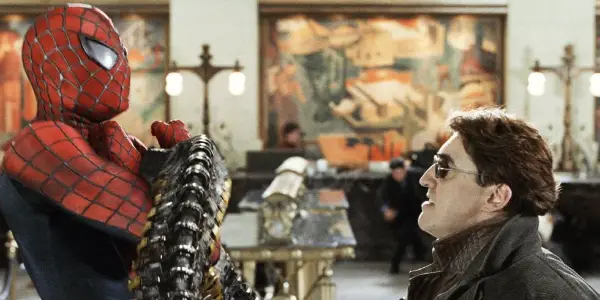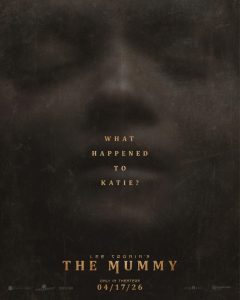
If Spider-Man (2002) was a template for what the modern superhero movie would become, its sequel, Spider-Man 2 (2004) feels like the standard bearer all future successors were asked to eclipse. I had never seen the movie before, as I was young during its initial run, but the aura of Spider-Man was always around. It was difficult not to be aware of him. 20 years later and I finally watched it.
Sitting in a packed theater there was a sense of buzzing anticipation when the opening credits came on backed by Danny Elfman‘s almost otherworldly score hinting at eccentricity. The Marvel monolith had yet to be fully consolidated and turned into a factory.
Because we already have some context for the character carrying over from the first movie, this film’s instincts are correct in reintroducing us to Peter Parker (Tobey Maguire) with an opening gambit full of levity.
We watch him racing to keep his job as a pizza delivery boy only to switch into the spider suit to beat mid-day traffic. There’s an extended bit involving a closet full of mops that had the audience in stitches as he sheepishly dropped off the pizza order with a bewildered secretary.
I’m usually oblivious about these things, but it does seem like Tobey Maguire has become a walking meme and a lasting internet celebrity based mostly on his Spider-Man persona. There’s something about his delivery that’s so awkward — maybe something about his quivering upper lip — or how he almost lisps out his lines of dialogue. But it’s also endearing.
And for every time the audience laughed, it was never out of derision. They love this guy. He is their dorky hero and they hold him aloft, so when he goes slinging webs and rises again above the skyline, there were audible cheers. The audience was behind him from the beginning. The same goes for the dialogue. Some of it might be inadvertently goofy and yet so much of the time, the movie seems in on the joke.
Director Sam Raimi is adept at allowing for these incubated moments of a visual gag or an insert with a cameo reaction that’s good for a laugh. They can involve a stolen pizza in the opening minutes or a fallible Peter stumbling away from a crash scene after he can’t catch his fall and sets off a nearby car alarm with the touch of his hand. It tempers the drama and simultaneously makes Peter a more delightful protagonist.
A Grounded Hero
This also hints at part of the dramatic question at the center of this film. What makes Spider-Man mythology so compelling is the nature of his superherodom as initially conceived by Stan Lee and Steve Ditko.
His story arc is grounded in relationships on all sides however rudimentary they might be. An aunt and uncle, his crush (Kirsten Dunst), and the alienation developing between him and his best friend (James Franc0). Peter is faced with the universal conundrum of what he wants versus what is sacrificial in the name of his city. With great power, comes great responsibility. But the words get muddier when it comes to practical application.
And the villainy is equally relatable. Alfred Molina is sympathetic but also carries a gravitas with his physique and stage presence that wears the role of Dr. Octavius well. He becomes first a mentor and then an adversary for Peter — a perfect foil for what he represents.
During a public showcase for Oscorps, his life’s work, involving the creation of a fusion power source, goes haywire. In the aftermath, his mental faculties get overridden by his new A.I.-driven mechanical arms. He knows not what he does becoming a public menace who wants to rebuild his reputation and avenge the loss of his beloved wife.
Due to the strains of the Spider-Man mantle, Peter’s grades are suffering, and he’s absent in the lives of the people he cares about most. Aunt May (Rosemary Harris) is about to go through eviction and MJ’s been making a name for herself as a theater actress and model. She feels like Peter has rebuffed her and it hurts. There is so much he wants to tell her but cannot.
He must make a decision, and at the same time, his powers begin to atrophy for inexplicable reasons. Peter decides to relinquish his Spider-Man suit because he doesn’t want to keep secrets from anyone. He steps back into the shadows to live a normal life even as the crime rate begins to rise in the city. There is no longer a protective hedge aginst crime and the rising forces of evil.
Poetry and Drama
I never thought I’d get T.S. Eliot or Joel McHale in this movie, but oddly enough both are featured. Peter pulls out Eliot in a NYC laundromat as he tries to wash his Spidey suit and looks for new ways to woo MJ. Girls supposedly dig poetry.
Meanwhile, McHale shows up as a teller in the bank who sheepishly tells Aunt May she’s not eligible for a loan. It’s one of any number of injustices that make Peter feel powerless to help the ones he loves. With the Russo Brothers‘ connection to Community, it also meant McHale‘s TV co-stars found their way into the superhero space in subsequent years.
source: Sony Pictures Releasing
From a dramatic standpoint, the gala in Spider-Man 2 where Peter is called upon to take pictures for The Daily Bugle feels like the nadir of his story thus far. An inebriated Harry Osborn (Franco) smacks him around in a very public setting and then Peter learns MJ is getting married to someone else; she’s not waiting on him any longer.
These are only the personal stakes, but so many subsequent superheroes have lost this reality and gotten muddled because they dealt in vapid exposition and nebulous things that we have little to no care for. Here it’s quite simple yet effective.
The action is immersive and the visual representation of Doc Ock with his mechanical arms has a real menace that rarely takes a false step in disrupting our suspension of disbelief. The whole film holds up quite nicely, though there are a few obligatory final shots that feel like gratuitous eye candy.
Aside from that, each confrontation between Peter and Octavius is imbued with an extraordinary level of narrative drama that goes beyond surface-level pyrotechnics. It’s meant for Saturday matinees as they duke it out inside the bank, then scaling buildings with Aunt May in the balance, or even battling over a railcar in a chase that evokes The French Connection with a Spidey twist.
What a wonderful and mysterious thing it is for Spider-Man to lose his mask, and far from castigating him or just wanting a piece of his celebrity, the people he saves acknowledge his youth and then vow to keep his secret. There is a neighborliness and a desire for the communal good that feels like wind under his sails.
Because while other installments about superheroes explore isolation, anonymity, and their identities as vigilantes, there is a sense that this Peter Parker does not have to worry. These people are protective of him, grateful for what he has done, and he deserves their care. After all, he’s only a teenager.
What’s more, he has a girl who will stick by him as he looks after the city. There is a precise moment of truth where Peter can allow his girl to know his full self. It’s a supreme gift for the character.
Conclusion: Spider-Man 2
Looking back now 20 years on, Spider-Man 2 is an early 21st-century depiction of the dangers of A.I., but at its core, it’s about a choice. Every great hero must decide what to do in the name of self-satisfaction or personal sacrifice.
The movie would also maintain the more dubious tradition of franchises outstaying their welcome. I’ve been told Spider-Man 3 jumped the shark, and yet I imagine even now there is a nostalgic patina hanging over the entire trilogy.
Spider-Man 2 is exuberant popcorn fare, and it was a pleasure to see it with an audience who cared about the movie so profoundly. It means something to them even after all these years. They may be older, but they come to this movie with the same reservoirs of affection. It’s the effulgent joy of any little kid who’s ever had dreams of being a superhero. I felt it too.
I’ve never been into ardent superhero fandom, but finally getting to witness Spider-Man 2 gives me a newfound appreciation for my peers and this communal experience. By the end, we all cared about Peter Parker too (even if Tobey is a little old to be playing a teenager). I’m still hoping the Marvel fad has finally begun to abate for more eclectic forms of entertainment, but that doesn’t mean we can’t celebrate these films and where they came from.
Spider-Man 2 was initially released in the U.S. on June 30, 2004.
Does content like this matter to you?
Become a Member and support film journalism. Unlock access to all of Film Inquiry`s great articles. Join a community of like-minded readers who are passionate about cinema – get access to our private members Network, give back to independent filmmakers, and more.










